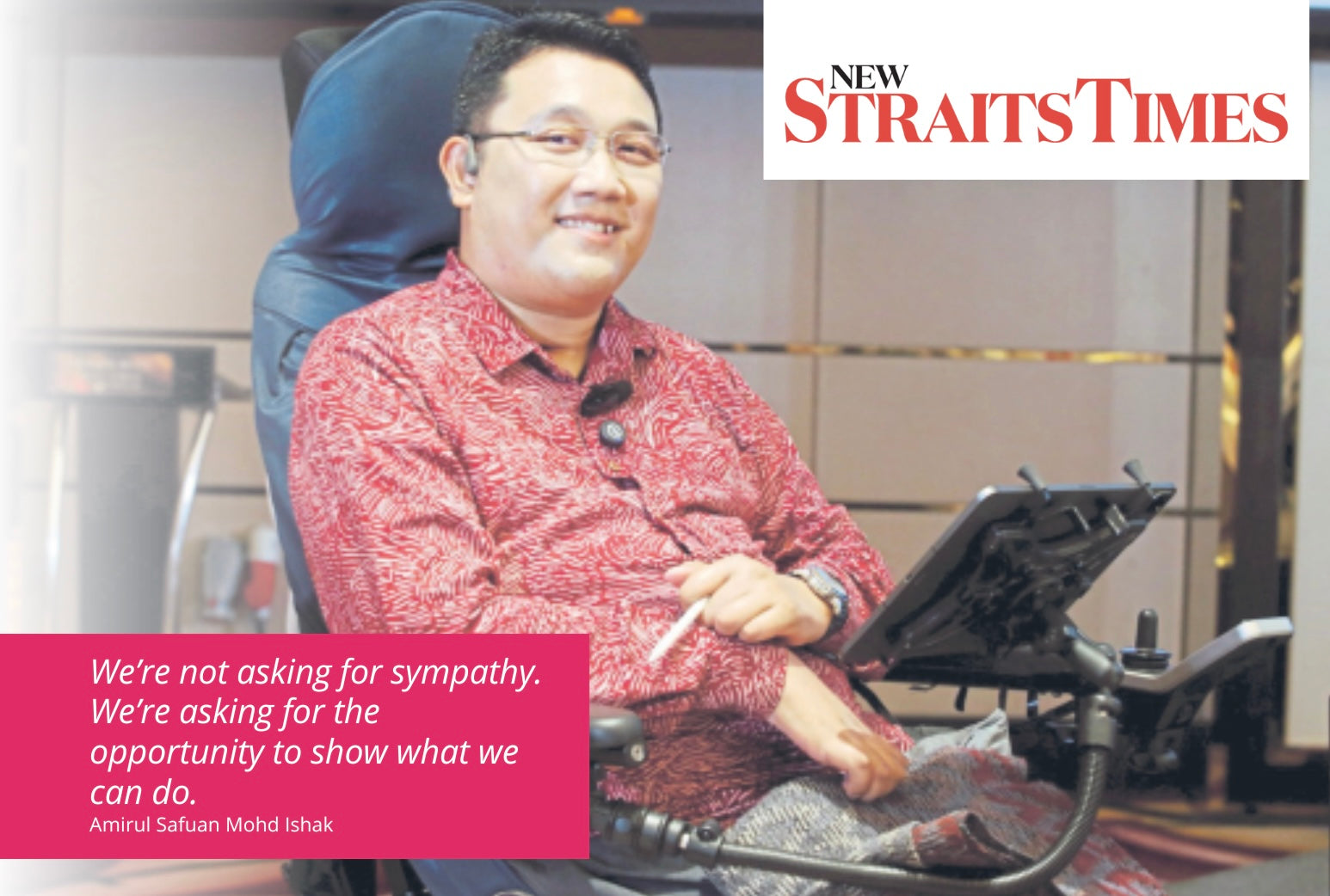
Sunday Vibes: From tragedy to triumph
A life-altering car accident left this man almost entirely paralysed, but he transformed his greatest challenge into a platform for change, writes Amisha Syahira, The New Straits Times.
On a rainy afternoon in 2020, Amirul Safuan Mohd Ishak’s life took a turn he never expected. The car accident that left him 86 per cent paralysed robbed him of an 18-year career in banking and investment.
But it sparked a different kind of rebirth.
Instead of succumbing to despair, he found strength in his circumstances and began charting a new course as an entrepreneur. Today, his venture, Ameer Safone Ventures, stands as a testament not only to his personal resilience, but also to the untapped potential of persons with disabilities (PwD) in Malaysia’s economy.
“It wasn’t just a physical transformation,” reflects Amirul, voice low, as he recalls the trauma of his diagnosis, which left him nearly unable to move. Adding, he confides: “The mental shift was even harder. I had to rethink everything — my career, my future. For months, I sent out resumes, but the rejections kept coming.”

Through Ameer Safone Ventures, Amirul hopes to pave the way for a future where Malaysia stands as a beacon of inclusivity.
The traditional route no longer felt accessible, and Amirul began to face the uncomfortable truth: there were no safety nets for disabled people in the workforce. With healthcare costs rising and little in the way of government support, entrepreneurship seemed to be the only viable path forward.
From this difficult beginning, Amirul found clarity and purpose, not only in securing his financial future but in giving a voice to a community often left behind. “I thought to myself, if I can’t find a job, I will create one. I’ll build something for myself and, hopefully, for others like me,” he continues, eyes flashing passionately.
OVERCOMING SYSTEMIC BARRIERS
As Amirul navigated his new reality, one truth became painfully clear: entrepreneurship for PwD is fraught with obstacles. Securing capital was an early hurdle. “In Malaysia, there are almost no funding opportunities for startups led by PwD,” he explains, before continuing: “It’s tough. Only 0.4 per cent of registered PwD are employed. We’re invisible in the job market, and that trickles down into the world of entrepreneurship too.”
We’re not asking for sympathy. We’re asking for the opportunity to show what we can do. - Amirul Safuan Mohd Ishak
The lack of financial support was compounded by a societal bias that often views PwD as liabilities rather than assets. “The narrative around disability is broken,” Amirul points out, adding: “People don’t see the potential in us. We’re often treated like we need to be taken care of, rather than celebrated for what we can contribute.”
Suffice to say, he’s working to change that narrative, advocating for more inclusive policies and practical support that would make it easier for PwD to enter the entrepreneurial space. The government’s increased focus on welfare for disabled individuals in the 2025 Budget is a step in the right direction, but Amirul insists that more is needed, particularly in terms of economic participation.

A car accident left Amirul almost entirely paralysed.
“The budget is a good start, but it’s not enough,” he says, tone wary. Adding, he points out the urgency for targeted programmes that specifically support disabled entrepreneurs, “. things like microfinancing, grants, and mentorship opportunities. These are crucial for us to grow, scale, and thrive.”
POWER OF FLEXIBILITY AND INCLUSION
As Amirul reflects on his own entrepreneurial journey, he highlights one critical lesson: the importance of flexibility. Inspired by the success of flexible working arrangements (FWAs) during the Covid-19 pandemic, Amirul sees great promise in the idea that work, like entrepreneurship, should not be constrained by rigid schedules or traditional office environments.
“We learned during the pandemic that work doesn’t have to happen from 9 to 5,” he notes, adding: “Flexible hours can be transformative for people like me. If businesses shift their thinking and prioritise quality over quantity, everyone benefits.”
He’s also calling for businesses to reimagine the workplace altogether, to better accommodate the diverse needs of PwD employees and entrepreneurs. Says Amirul: “A one-size-fits-all approach doesn’t work. Corporations need to be willing to adapt, to provide spaces and schedules that allow us to contribute in meaningful ways.”
VISION FOR AN INCLUSIVE FUTURE
Amirul’s journey from paralysis to progress is about much more than personal triumph — it’s about advocating for change at a societal level. “For my fellow PwDs, I urge you to embrace your journey. Your story, your resilience, is your strength. We’re more than our disabilities; we’re capable of greatness,” he exclaims passionately.
His call to action is both personal and collective: to businesses, government agencies, and society at large, he urges a fundamental shift in perspective. “Don’t see us as charity cases or as people to be pitied. See us as assets — people who bring unique perspectives and valuable skills. When we’re given the chance, we can open up new opportunities for businesses and for society.”
Through his entrepreneurial work with Ameer Safone Ventures, Amirul hopes to pave the way for a future where Malaysia stands as a beacon of inclusivity, leading the charge in both the economic and social empowerment of PwD. His vision is simple: to create a country where everyone, regardless of their physical abilities, has the chance to contribute, to succeed, and to thrive.
“We’re not asking for sympathy,” Amirul concludes, adding: “We’re asking for the opportunity to show what we can do. And once we’re given that chance, we’ll prove that we’re capable of so much more than anyone ever expected.”
In the heart of his entrepreneurial venture, Amirul has discovered something profound: true inclusivity doesn’t just benefit the individual — it uplifts the entire community. And, with the right support, PwD entrepreneurs can change the country’s economic landscape and create a brighter, more inclusive future for all.
